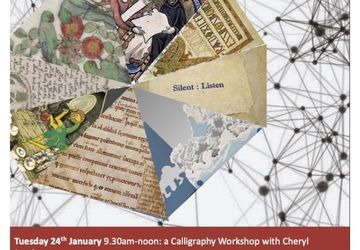Event Series
January 26: Lines 1-1250
The Mystical Qualities of Mead (by Max Ashton) • Old English Reading with Live Harp Accompaniment • Complimentary Mead from Heidun Meadery (Must be 21+) • Reading of Beowulf's Battle Against Grendel from Seamus Heaney's Translation of Beowulf • Free Copy of Beowulf • Space Limited: Pre-Registration Required!
February 9: Lines 1251-2199
All About Mead Halls (by Johnathan Quick) • Old English Reading with Live Harp Accompaniment • Complimentary Mead from Heidun Meadery (Must be 21+ • Reading of Beowulf's Battle Against Grendel's Mother from Seamus Heaney's Translation of Beowulf • Free Copy of Beowulf • Space Limited: Pre- Registration Required!
February 23: Lines 2200-3182
On Medieval Music (by Elaine Treharne) • Old English Reading with Live Harp Accompaniment • Complimentary Mead from Heidun Meadery (Must be 21+) • Reading of Beowulf's Battle Against the Dragon & Death from Seamus Heaney's Translation of Beowulf • Free Copy of Beowulf • Space Limited: Pre-Registration Required!
The Center for the Study of the Novel promotes conversation on the novel and related narrative genres as these forms have been practiced across history and cultures. CSN is committed to the importance of studying literature as a primary form of human expression, even as it examines what interdisciplinary perspectives may tell us about literature and the novel in particular. CSN further is committed to studying the history and practice of literary criticism and theory illuminating the novel and its relations to society and culture.
Objects of inquiry include long prose fictions, the powerful cultural role played by the novel, oral forms and their relation to print culture, as well as the expansion of narrative into newer media, such as cinema and digital technologies. We attend to the poetic and aesthetic dimensions of the novel and ask how the literary aspects of the novel are shaped by extra-literary contexts and other artistic paradigms. Even as CSN devotes significant attention to major works of the novelistic canon, we also study forgotten and poetically devalued novels, including those that are situated at, and help to define, the boundaries of the genre.
Click here to visit the Center for the Study of the Novel website
Methods Café is a dialogue series in the English Department that pairs faculty members in a conversation about literary theory. Primary texts are chosen to exemplify relevant theoretical models.
One variation will bring together two conversationalists who will apply the theoretical model in a published book or other work to an analysis of the primary text, from their own viewpoints. The other variation will center on one conversationalist asking another to explain the salience of a given work of literary theory and how it has had an impact on their thinking.
Get an insider’s look at forgotten masterpieces in a unique book club at Stanford! Another Look selects brief works to encourage busy Bay Area residents to read, meets quarterly and features a panel discussion of professors and writers, followed by an audience discussion. Check out the club’s website for the next book selection, author insights and podcasts.
Our workshop examines the “contemporary” with a focus on defining moments such as: 1945, 1973, 1989, 2001, and 2020. In recent years the concept of the contemporary has been taken up within limited disciplinary discourses and in the context of distinct geographical settings. The horizon of this workshop, however, is the global. We employ a comparative and interdisciplinary approach to the hybrid term “contemporary” as it intersects various fields and serves as a heuristic device to understand phenomena in politics, culture, and the arts.



